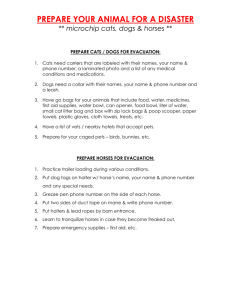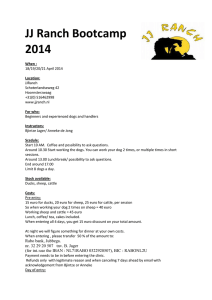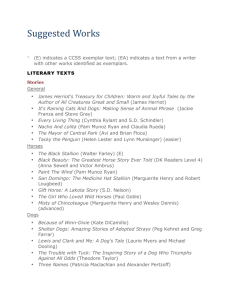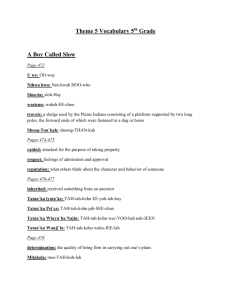Animal neglect speech
advertisement
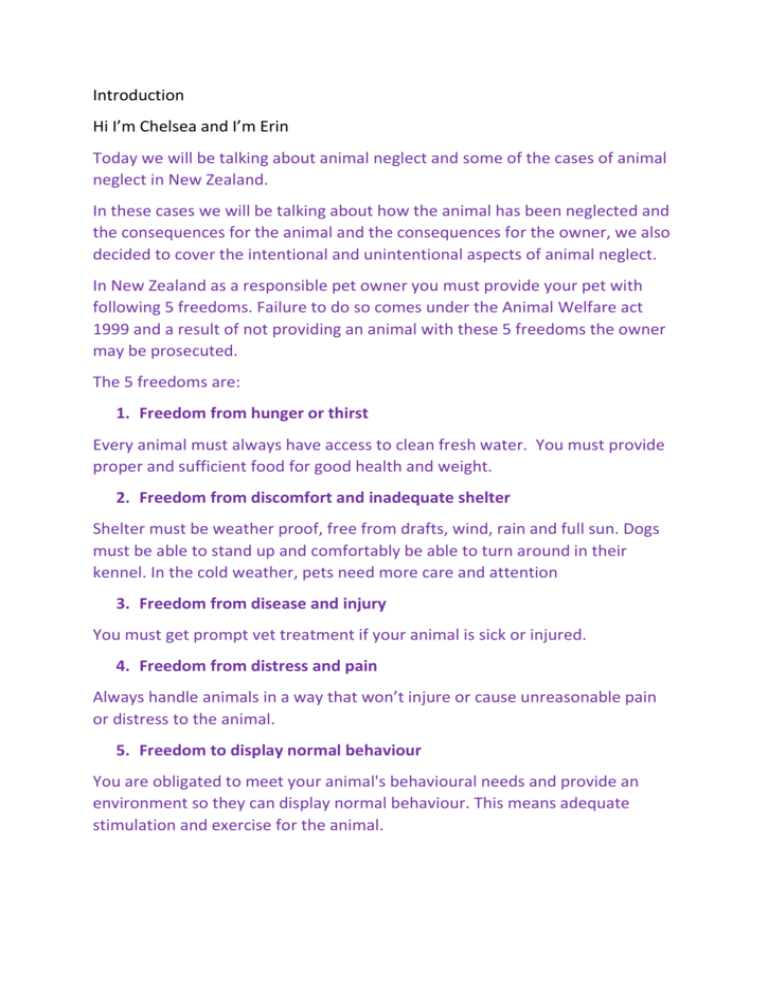
Introduction Hi I’m Chelsea and I’m Erin Today we will be talking about animal neglect and some of the cases of animal neglect in New Zealand. In these cases we will be talking about how the animal has been neglected and the consequences for the animal and the consequences for the owner, we also decided to cover the intentional and unintentional aspects of animal neglect. In New Zealand as a responsible pet owner you must provide your pet with following 5 freedoms. Failure to do so comes under the Animal Welfare act 1999 and a result of not providing an animal with these 5 freedoms the owner may be prosecuted. The 5 freedoms are: 1. Freedom from hunger or thirst Every animal must always have access to clean fresh water. You must provide proper and sufficient food for good health and weight. 2. Freedom from discomfort and inadequate shelter Shelter must be weather proof, free from drafts, wind, rain and full sun. Dogs must be able to stand up and comfortably be able to turn around in their kennel. In the cold weather, pets need more care and attention 3. Freedom from disease and injury You must get prompt vet treatment if your animal is sick or injured. 4. Freedom from distress and pain Always handle animals in a way that won’t injure or cause unreasonable pain or distress to the animal. 5. Freedom to display normal behaviour You are obligated to meet your animal's behavioural needs and provide an environment so they can display normal behaviour. This means adequate stimulation and exercise for the animal. What is animal Neglect? To my understanding animal neglect is when the owner of the animal fails to provide basic care for an animal (five freedoms) and the animal suffers as a consequence. Unintentional Neglect Unintentional neglect can be for many reasons. This is when the 5 freedoms have not been met. The owner may not have been educated to provide adequate care for an animal and does not know any better. Or the owner is not aware of the harm and effect caused to an animal. An example of this is a dog locked in a hot car. Every summer dogs suffer in hot cars while their owners stop in at shops. On a hot summers day a car will heat up very quickly even with windows slightly opened. A car parked in the shade on a 30 degree Celsius day will heat up to 39 degrees Celsius in just 10 minutes. Dogs can only withstand temperatures of these extremes for very short amounts of time before suffering from irreparable brain damage or even death. This is due to the fact dogs cannot sweat like humans and the only way of cooling themselves is panting. Dogs also need access to plenty of water and cool fresh air to be able to regulate their body temperature. This is not at all possible while being shut or locked in a car. In such cases the SPCA will prosecute where appropriate and this may lead to imprisonment for a term not exceeding 3 years, or to a fine not exceeding $75,000 or to both. There are many reasons people may take their dogs in the car with them, they may even think they are doing the dog a favor giving them company. But the moment the dog is left in the car the dog is at risk of being distressed and overheating. This can be avoided by leaving the dog at home or when you get out of the car take the dog with you where possible. Intentional Neglect This is when the owner is aware of the conditions and circumstance of the animal yet fails to meet the 5 freedoms. We found two cases of animal neglect. The first case we found were two brothers from Canterbury that had starved and neglected their horses. On March the 29th 2010 a team of inspectors went to the two brothers property, There were a total of 22 horses on the property, 5 horses had to be put down to end their suffering. Some horses had body scores of 0 out of 5, and some had 2 to 3 out of 5. Out of the 22 horses 10 had a body condition score of 0 out of 5 (1 being poor and 5 being very fat). Seven horses scored 1 to 2 out of 5 and the other 5 horses were in good condition with scores of 2 to 3 out of 5. The second case was a Hawkes bay farmer who intentionally neglected his sheep, which lead to the death of 29 sheep. Napier SPCA investigators found several hundred heavily fleeced sheep grazing in paddocks where large amounts of blackberry were growing. Over 2 days the instigators found 49 sheep entangled amongst the blackberry and 21 of these were dead and in various states of decomposition. A further 9 sheep were found dead in streams, bogs and open paddocks elsewhere on the property. As sheep were cut free by the inspectors they found four live animals in such a poor condition they had to be euthanized immediately to relive their pain and distress. The injuries included a broken hind limb, blindness and one sheep that lost an eye had worn a deep groove in the soil trying to break free from the blackberry. 8 sheep were put down. Danny B Danny B is a case of intentional neglect; he was one of the horses who were taken from the property of the two brothers in Canterbury. Danny B a black/brown stallion was found on these premises confined in a small, dark stable approximately 3m wide and 5m long. There was no ventilation with only one door, very little water available and no feed. Danny B had a body score of 0 out of 5 and was severely emaciated. He was found standing in a stall full of urine and faeces. All of his limbs were swollen and patches of hair loss over his body. Danny be was seized and put in a rehabilitation program and made a full recovery. Consequences for the owner The two brothers in Canterbury were sentenced to 16 months imprisonment also disqualified from owning animals for five years and had to pay $7000 for reparation. The second case Hawkes bay farmer was ordered to pay $7000 to the SPCA and $529 in reparation for the veterinary bills to treat the wounded sheep. What is the law relating to animal welfare? This is the animal welfare act 1999 under the New Zealand legislation. It’s a very wide ranging act that deals with the handling and management of animals and offences towards animal’s wellbeing. A person who commits an offence against the animal welfare act may face multiple penalties. Each case varies as not all offences are the same. Chelsea’s part is in black. Erin’s part is in purple.
